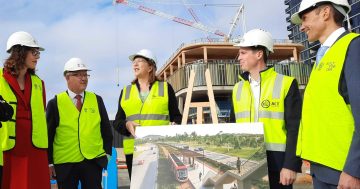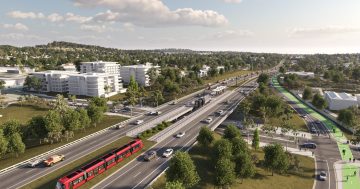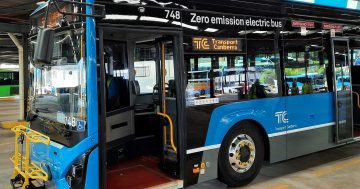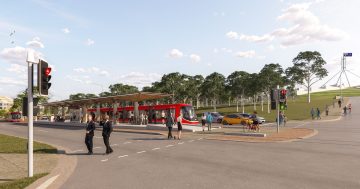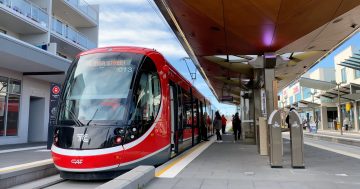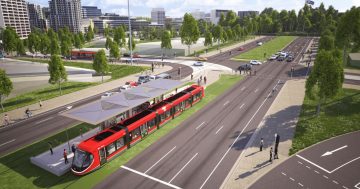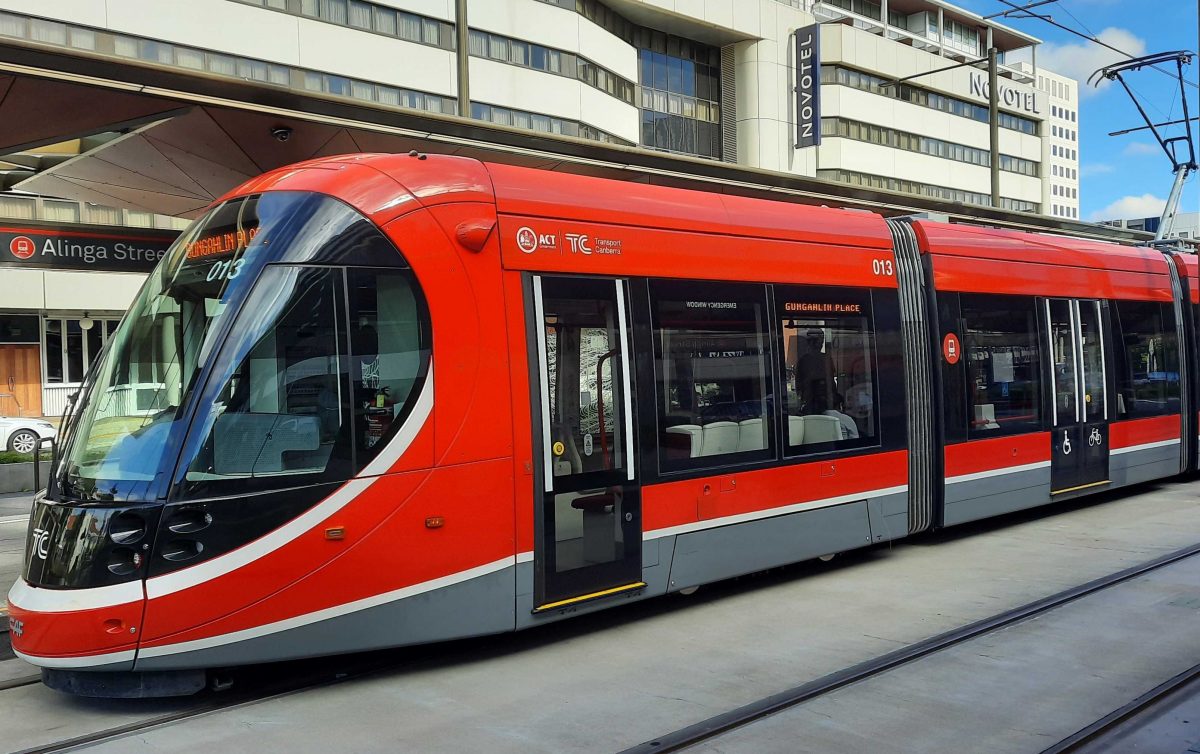
The current light rail terminus at Alinga Street in the city. It may get to Commonwealth Park, but is community resolve wavering on Woden? Photo: Region.
If light rail advocates were expecting the ACT’s powerbroking senator David Pocock to extract funding for the light rail extension to Woden, they might have to think again.
It looks as if Senator Pocock is positioning himself to make other infrastructure needs such as a new convention centre and stadium priorities over light rail, calling for the federal and ACT governments to reconsider the project.
It could spell trouble for the project if Senator Pocock is prepared to use his key vote to win funding for his favoured projects at light rail’s expense.
Senator Pocock has been doing the rounds at community meetings where he has heard arguments against light rail and in favour of cheaper alternatives.
Keen observers of the Australian Story episode last week on the new senator noticed a grab towards the end in which he appears to talk about $880 million of light rail funding. However, the context of the comment is unclear.
Senator Pocock clarified to Region where he stands on extending light rail, first to Commonwealth Park and then to Woden. It seems he now has concerns about the cost and disruption, questioning where it fits among community priorities.
He also said that there may be cheaper public transport alternatives to consider.
Although he acknowledged that despite early concerns, Stage 1 had been a “tremendous success that has far exceeded expectations”, Senator Pocock said many of the factors that made Stage 1 such a success were absent from Stage 2 (both A and B).
“Speaking to the community it’s clear that while there are some who support it there are others who have real concerns around the next stages of light rail,” Senator Pocock said.
“The fact is that we don’t have a clear picture around costs, people are anxious about the disruption the project will cause in the city and there is a live question about priorities.
“I note the ACT Auditor-General has also highlighted some pretty significant issues, including with the cost-benefit analysis.”
Senator Pocock said significant technological advances since the light rail project was first conceived meant there were more cost-effective options available, including electric buses and trackless trams similar to those being trialled in Brisbane.
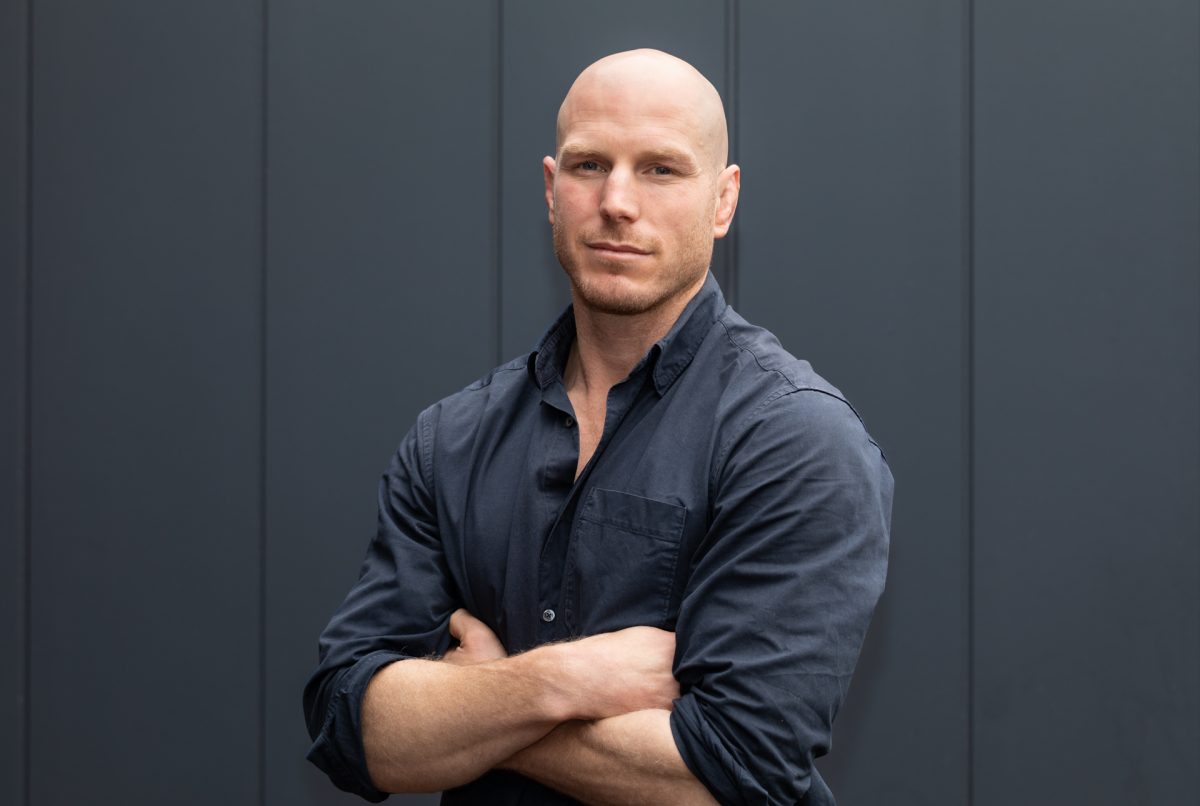
Independent Senator David Pocock: “There is a live question about priorities.” Photo: Michelle Kroll.
He also raised the budget issues both the federal and ACT Governments faced.
“Given how tight budgets are, both federally and in the ACT, it is not only reasonable but necessary for decision makers to revisit whether the current plans are the right ones,” Senator Pocock said.
“Ultimately, this is a decision for the ACT Government. However, given the Federal Government’s involvement in helping fund the project and the feedback I’ve received from Canberrans who want to see investment in other territory-building infrastructure projects like a new convention centre, stadium and community sporting and multicultural infrastructure, it seems appropriate to contribute to the discussion.”
Senator Pocock’s comments disappointed Public Transport Association of Canberra chair Ryan Hemsley who warned against thinking unproven, alternative technologies would get southside residents a dedicated transport route any cheaper or sooner.
“Unfortunately, it appears Senator Pocock is poorly informed in this regard. A planned extension to the Brisbane Metro is expected to cost $1.3 billion for just over five kilometres of surface busway and four new stops,” Mr Hemsley said.
“It is not a cheaper alternative to light rail, and any attempt to change Canberra’s approach now will only delay a well-advanced project.”
He said it was sad to see this framed as a contest between light rail, which will serve over 20,000 people every day, and a stadium, which might do so on a handful of days each year.
“Canberrans should and can have both,” Mr Hemsley said.
Also disappointed was Transport Minister Chris Steel, who offered Senator Pocock a briefing on light rail to Woden.
“Light rail is a key part of our plan to tackle transport emissions and achieving the ACT’s goal of net zero emissions by 2045,” Mr Steel said.
“Buses alone haven’t and won’t achieve the shift to sustainable transport and won’t deliver the city shaping benefits that Canberra needs into the future.”
He said the Government did not believe the southside should be excluded from Canberra’s light rail network, saying the extension of the line to Woden was important to support the city’s growth, with a central mass-transit spine linking the north and south.
“The first stage of light rail has been very successful in driving higher public transport use with people wanting to live and work near the line, creating more vibrant and sustainable communities,” Mr Steel said.
“This is an infrastructure project that will create and support thousands of local jobs throughout its construction, which I’m sure the Senator would realise is important for our local economy over the next few years.”
But the Canberra Liberals also appear to be hardening their position on light rail, with an announcement imminent from Transport spokesperson Mark Parton.
Mr Parton has argued for greater transparency around Stage 2A and questioned whether it stacks up, as well as trying to pin down Transport Minister Chris Steel on completion dates for both Stages.
“The Canberra Liberals have significant concerns about Stage 2 of light rail based on the very limited information the Labor-Greens government have provided to the community,” Mr Parton said.
“There are a number of questions the Canberra Liberals have asked of the Labor-Greens government regarding light rail, and as shown during the recent estimates hearings, the Transport Minister refuses to provide information on the cost of Stage 2 and when light rail is anticipated to reach Woden.
“The Canberra Liberals will have more to say on light rail in the coming weeks.”
The Federal Government has committed $132.5 million for Light Rail Stage 2A, and the supportive Infrastructure Minister, Catherine King, is expecting the Territory to ask for more when it’s ready to talk about Stage 2B.
Works to raise London Circuit in preparation for building Stage 2A are getting underway with the main construction ramping up from next April. The laying of track will be at least two years away.
Canberra commuters will face years of disruptions while light rail is being extended to Woden.












